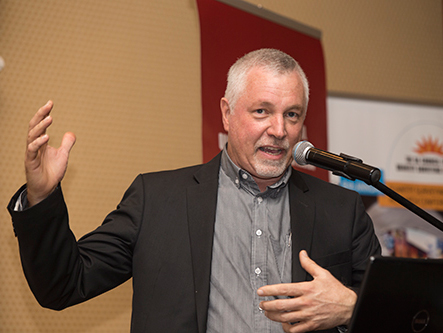
Ikeys business school teaches executives to resist the urge to cut budgets during a contraction

The latest economic data paints a grim picture for many businesses in southern Africa with the South African Chamber of Commerce and Industry Business Confidence Index dipping to 93.7 index points after decreasing steadily from the 99.7 of January this year.
The biggest impact came from the weak rand, lower retail sales, higher energy costs and a steady decline in the value of building plans passed.
“For chief executives and business leaders this is undoubtedly a challenging time,” said Paul Maughan, a lecturer at the Graduate School of Business of the University of Cape Town.
Fuel prices are higher, business confidence is lower and the ABSA manufacturing purchasing managers index fell to its lowest level in three months in June 2018. International ratings agency Fitch revised its forecast economic growth to 1.7%, down from 2.3%. Similarly, both Investec and UK-based researcher, Capital Economic, have revised their GDP growth projections, now expecting just sligthly more than 1% growth for the year.
As Maughan deals with chief executives and senior managers on a daily basis at the school, he said they are increasingly under pressure to cut costs across the board.
“When times are tough many companies and organisations instinctively want to tighten their belts, often cutting down on executive training and marketing spend. There is a tendency to want to hide and ride out the storm but history tells us that those companies that do well in tough times are those that do the unexpected,” he said.
Research by Bloomberg after the 2008 recession, for example, found that many thrived by resisting the customary corporate reflex to contract.
“There is almost always opportunity in a recession for those who are able to spot it and act on it, commented Maughan citing the example of Netflix who came out stronger than ever after the 2008 financial crisis by offering alternatives to satellite TV subscription models. Today Netflix grosses more than US$11 billion from its impressive 125 million subscribers.
“When change is getting faster, your responses need to get faster and surer. Your competitors could come from anywhere, and you need to have a whole new way of dealing with that,” said Maughan.
The key is in ensuring long-term resilience, through both hard skills – like finance, innovation and marketing – and softer skills, like talent management, relationship-building, negotiation, executive wellness and self-leadership. And, for long-term growth, inclusive innovation must be nurtured.
How do you grow in a time of uncertainty? It is this question that should motivate senior executives to focus on developing strategic capabilities that can weather unpredictable environments, or facilitate innovation when resources are limited or during times of change, according to Maughan.
“Breaking bad habits, changing leadership styles and approaches, and unlearning unhelpful strategies are instrumental to maximising a business leader’s impact in difficult economic times,” he said. “Building personal resilience is key. Burnout is a very real factor at the top.”
To illustrate the key role of executives, Maughan cited the case of Steinhoff, a once thriving company now fighting for survival after executive wrongdoing surfaced. On the opposite end of the spectrum are companies like the South African Postal Services, successfully revived by the leadership of Mark Barnes.
“It is not an exaggeration to say a good leader can make or break a company. That is why investing in executive education will always pay off” Maughan concluded.












































